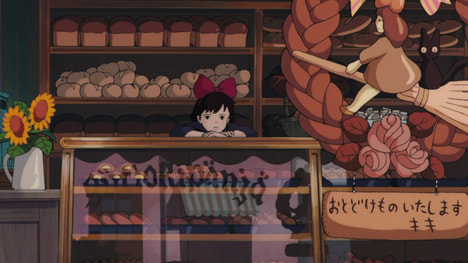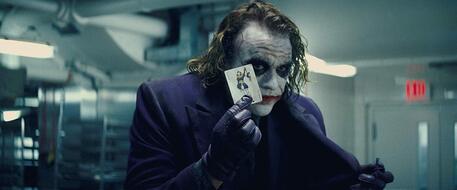A- | Bruce Wayne chases a new chaotic presence in Gotham City while wondering if it's time to hang up the cape. Directed by Christopher Nolan Starring Christian Bale, Heath Ledger, and Aaron Eckhart Review by Jon Kissel |

A mental alarm bell rings every time Joker is referred to as a terrorist, a purposeful evocation of the disillusioned time The Dark Knight was made. Whatever righteousness existed in the wake of 9/11 had been thoroughly spent by the mid-2000’s, as the country has witnessed what vengeance looks like on a global stage. Torture, massacres, black site prisons, and illegal mass surveillance have all been committed by the aggrieved party, and blowback from those and other actions have laid the seeds for worse actors to eventually emerge. In Nolan’s mythos, borrowing heavily from current events, Batman was right to emerge, but his methods, satisfying as they were, were doomed to fail. He and co-writer/brother Jonathan Nolan are preoccupied with War on Terror allegories, but their interrogation of them lands poorly and childishly. Mass surveillance tools are dangerous, unless one really, really needs them. People won’t actually blow each other up when threatened. Wealthy underworld figures are to blame, not the wealthy who attend political fundraisers. Nolan’s moral universe is constrained by its comic book setting. No matter how relevant he wants The Dark Knight to be, the real world at this time is too dark for mass markets. Nolan’s shortsightedness is most apparent in Alfred’s (Michael Caine) story about the Burmese bandit who just wanted to watch the world burn, who tossed away his loot to local villagers. Alfred can’t even imagine that the bandit might have been someone who didn’t want the imperialist British, on whose behalf Alfred was operating as a commando, in his country. Nope, the bandit was just interested in chaos, bing, bang, boom.
None of this dissection would be necessary if The Dark Knight wasn’t taking long pauses to extemporize on human nature and the strength of the bonds of civilization. This is the worst trend that The Dark Knight is responsible for. Though Marvel films exist in an opposite tone, even they’re given to the kinds of debates that no superhero movie is equipped for. In wanting to make a superhero film that exists in the real world, Nolan is successful with the tech and the consideration of consequences. He insists on going further than that, like he’s Alexis de Tocqueville and he’s going to crack America wide open.
This film is not equipped to give itself over to these scenes, but that doesn’t mean they aren’t compelling. This is most true when it’s the Joker who’s speaking. There’s some snob part of myself that wants to discount Ledger, like a superhero movie isn’t allowed to have one of the great villainous performances. He consistently ranks near or at the top of pop aggregator sites whenever they do relevant lists, and there’s a twinge of resistance that exists and then dissipates when I watch a clip. Ledger’s giving a busy performance with all of his tics, but it’s precisely calculated. Joker is fully realized from the mannerisms to the costuming and the makeup. It’s controlled chaos, and entirely riveting. I clearly remember seeing this in theaters and being blown back in my seat by what he’s doing. He’s the best part of any of Nolan’s movies, the source of the most comedy for a generally humorless director, and the center of my favorite Nolan shot i.e. a triumphant and newly escaped Joker flailing out of the window of a police car. Joker’s as persistently good as the aggregators say he is.

Metatextual complaints aside, the greatest compliment that can be paid to Ledger is that his success covers up for The Dark Knight’s flaws. Not only is it half-measured in its political imagination, but its plotting is riddled with holes. The opening bank heist, as strong as it is, doesn’t require the deaths of Joker’s henchmen. He confesses to the crime while it’s happening and he doesn’t care about taking the whole package for himself. His character also provides an excuse for the movie to be sloppy. Why’d the Joker do X? Because he’s crazy/chaos incarnate! Joker’s infiltration of the wealthy fundraiser is a scene that ends too soon and without sufficient thought to the ramifications of it. The faked death of Jim Gordon (Gary Oldman) continues to make no sense. This wildly cruel ploy that requires his wife and children to be kept in the dark is only necessary because he needs to be in the paddy wagon with Dent during the mid-film climax. It also presupposes that he won’t be killed in the assassination attempt on the mayor, which happens organically in the film, so there’s off-camera scenes of an injured Gordon (red mist can be seen when he’s shot) plotting with only Batman to fake his death so Batman can later fake incapacitation only for Gordon to show up with a shotgun at Joker’s throat. It’s a cheap cheer moment that crumbles under further consideration. Also, this being a middle chapter, a downer ending is expected and the film sails over the obvious one. The correct ending is the all-is-lost moment when Joker has escaped, Dent’s scarred, and Rachel’s dead. Pad a little before this moment to get to two hours, and this is an immaculate package of taut plotting, especially considering the clumsy morality plays that emerge in the last 45 minutes. Obviously, Ledger’s absence from the final part of the trilogy would weigh heavily if the second film ended at the height of the character’s power, but it’s not like Dark Knight Rises has a satisfying ending as it exists.
Nolan’s on firmest ground with the direction. The hand-to-hand is not his strong suit but the deliberate nature of it, with Batman making one solid move at a time, speaks to his specific fighting style. The practical stunts are masterful, starting with imperfections in the opening heist. One of the rappelling thieves trips on his landing, and the choice to leave this flub in is a promise to the audience that most of what they see was done by real people, and that promise gets fulfilled when a tractor trailer is flipped end over end in a complete and comprehensible shot. That flipping is the culmination of a middle 30 minute stretch, from Dent’s arrest to Joker’s dog-out-a-window impression, that stamps this film with immortality, whatever other problems it might have. The Dark Knight isn’t a consistent top-to-bottom masterpiece, but it’s as good as action filmmaking gets when all of its pieces are working together.
The Dark Knight’s importance and legacy imply a better and more consistent film than what exists, but the undisputed greatness of major parts of it allow for some amount of grade inflation. What comes after The Dark Knight is worse, if not poisonous with the elevation of certain segments of fan culture, but the instigator of a trend isn’t responsible for what it spawns. What it is responsible for is an unforgettable theater experience and an all-timer performance. Films have persisted with fewer superlatives, and The Dark Knight is going to last for a long time. B+
 RSS Feed
RSS Feed